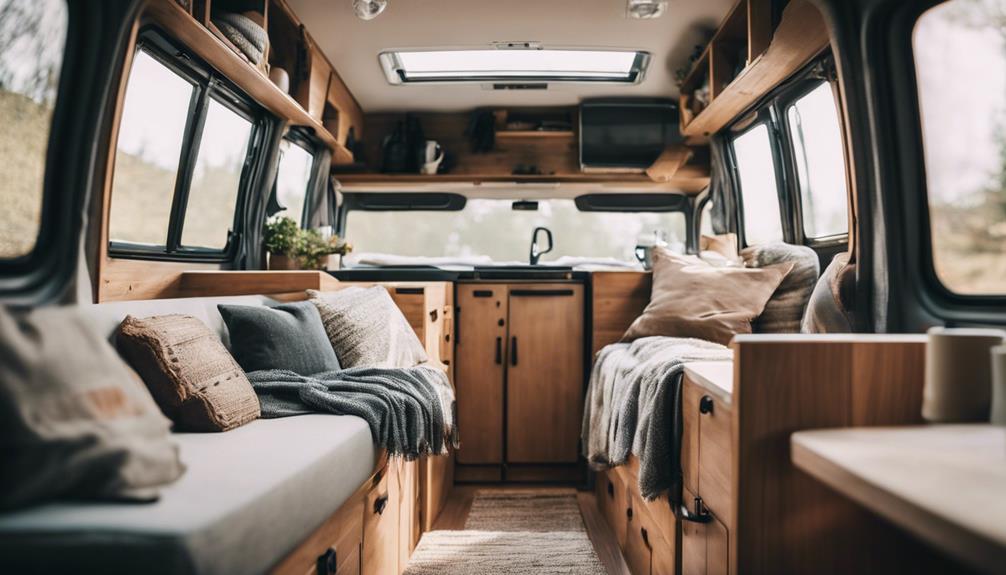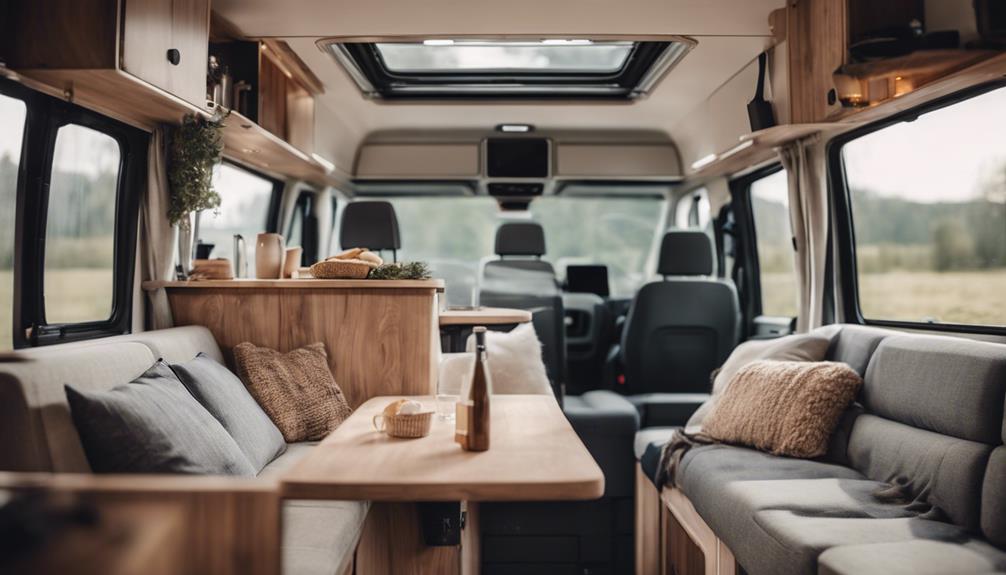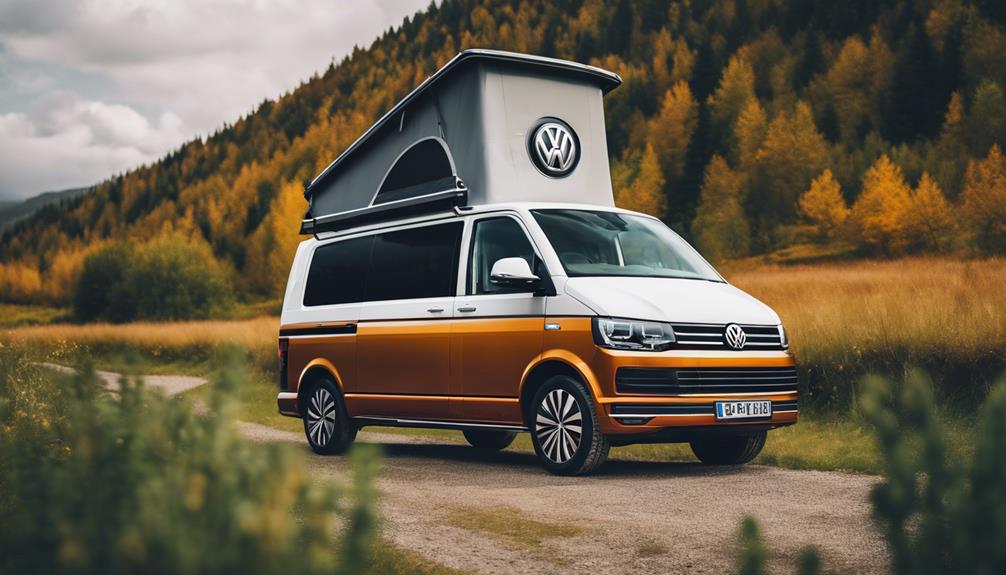When choosing a van for camper conversion, consider size for ideal space and comfort. Medium wheelbase (MWB) vans are often your best bet, striking a balance between roominess and maneuverability. If you need more amenities and space, long wheelbase (LWB) vans offer that extra room. High roof models are perfect if you want to stand comfortably inside. Smaller vans can be easier to park but may compromise on comfort and storage. Fundamentally, assess your travel needs, storage requirements, and budget to find the right fit for your adventures ahead. There's more to explore about design tips and innovations!
Introduction
Choosing the right van size for your camper conversion is vital to guarantee comfort and practicality for your adventures.
When you're considering van life, think about how many travelers will be on board. If you've got a larger group, long wheelbase (LWB) vans are your best bet, providing ample interior space. Medium wheelbase (MWB) vans offer a balance between roominess and practicality, making them versatile for both camping and daily driving.
Don't overlook the roof height either. High roof (HR) models, around 110 inches tall, allow for comfortable standing height, while medium roof (MR) options at 100 inches might feel cramped for taller individuals. Your choice will heavily influence how well you can move around and utilize the space effectively.
Budget considerations are important, as larger vans tend to come with higher purchase and maintenance costs, which can impact your overall conversion budget. Researching van conversion companies can help you find the right fit for your needs while staying within budget.
Ultimately, the best van size will enhance your camping experience, providing comfort and utility for every journey.
Background Information
In recent years, campervan conversions have surged in popularity, especially during the 2020s.
You've likely noticed the growing interest in the campervan market, with statistics reflecting an increase in sales and conversions.
Understanding this trend can help you choose the right van size for your adventure needs.
Campervan Popularity Surge 2020S
The popularity of campervans has skyrocketed since 2020, as more travelers embrace the freedom and safety of life on the road. People are increasingly drawn to camper van conversions, which allow for personalized spaces designed for comfort and functionality. The rise of van life has been fueled by social media, where hashtags like #vanlife showcase stunning adventures and inspire countless others to join the movement.
With the trend towards remote work, many individuals and families see camper vans as an affordable option for combining work and travel. You can enjoy years of driving while exploring new places, all from the comfort of your own converted space. A growing number of conversion companies are stepping up to meet this demand, providing innovative solutions that include ample space for storage and living areas.
As the campervan market continues to expand, manufacturers are investing in production capabilities to keep up with the surge in interest. This means more options for you to choose from, whether you're looking for a compact van or something more spacious. Embracing the van life lifestyle can offer a unique way to travel and live on your own terms.
Campervan Market Growth Statistics
Campervans have become a booming market, valued at around $57.1 billion in 2021 and projected to hit approximately $114.1 billion by 2030. This growth reflects a compound annual growth rate (CAGR) of 8.2% from 2022 to 2030.
Increasing consumer preference for outdoor adventures, especially among millennials and Gen Z, drives the demand for camper vans. You'll find that the rise of remote working has created a desire for flexible living arrangements, allowing people to travel while fulfilling work commitments.
The COVID-19 pandemic has further accelerated interest in van life, as many opt for safer, socially distanced travel options over traditional vacations.
Innovations in camper van conversion designs have also played a role, with a focus on sustainable materials and eco-friendly technologies attracting environmentally conscious consumers.
As the market continues to expand, you'll see more options that cater to diverse needs—whether for weekend getaways or long-term adventures. With these trends in mind, the campervan market is poised for continued growth, meeting the needs of those seeking a lifestyle that combines travel, work, and sustainability.
Recent Market Innovations
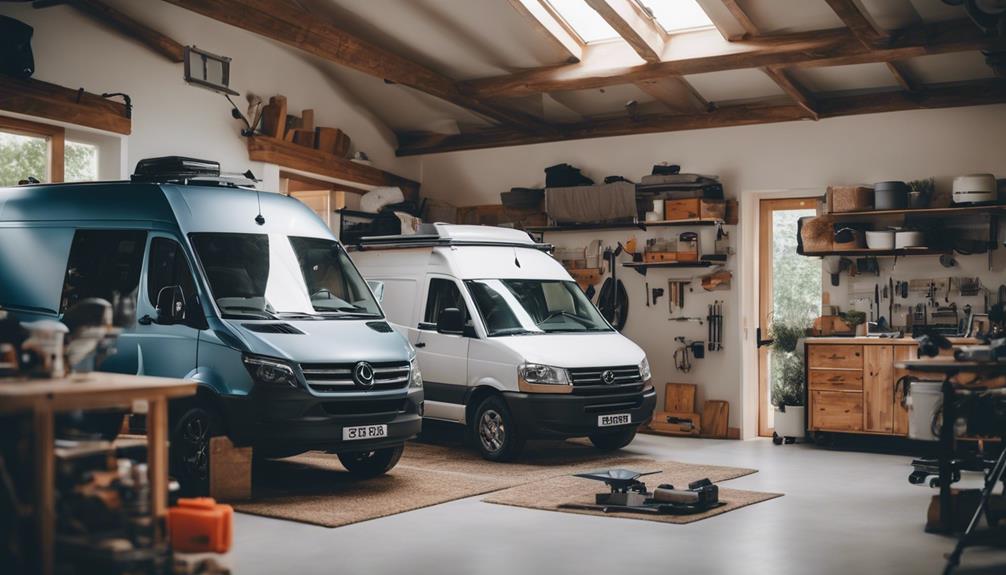
You'll find that recent innovations in van conversions are transforming how you think about space and functionality.
With advanced electrical systems and modular interior designs, you can create a living environment that perfectly suits your travel needs.
These emerging technologies not only enhance comfort but also offer you more flexibility than ever before.
Emerging Van Conversion Technologies
Innovative technologies are transforming camper conversions, making them lighter, smarter, and more efficient than ever before.
You'll find that lightweight materials like composite panels and aluminum framing greatly reduce your van's weight while ensuring structural integrity and insulation. This enhancement allows for better fuel efficiency and easier handling on the road.
Solar energy systems have evolved, with flexible solar panels paired with high-capacity lithium batteries, enabling you to enjoy off-grid living for extended periods. This means you can explore without being tethered to traditional power sources.
Incorporating smart home technology into your van lets you control lighting, heating, and appliances right from your smartphone, enhancing your convenience and energy efficiency.
Additionally, modular furniture designs, such as collapsible tables and foldable beds, create flexible living spaces tailored to your needs.
Advances in plumbing, including compact water filtration units and tankless water heaters, improve water management and provide on-demand hot water, making your camper experience even more comfortable.
With these innovations, your camper conversion can be a true home on wheels, designed for modern travel.
Innovative Modular Interior Designs
Recent developments in modular interior designs have revolutionized camper conversions, offering customizable solutions that adapt to your unique lifestyle and travel needs. These modular designs utilize interlocking components made from lightweight materials, ensuring you can easily reconfigure your space without adding extra weight to your vehicle.
With a focus on space efficiency, innovative features like foldable furniture—think beds and tables—allow you to maximize your living area for various activities. This flexibility means you can create a comfortable and functional environment tailored specifically to you.
Durability is also key, as advanced materials such as composite panels and lightweight metals enhance the longevity of your camper while improving fuel efficiency. Additionally, smart technology integration, including app-controlled lighting and temperature systems, empowers you to manage your living space effectively while on the go.
Furthermore, clever storage solutions, like under-bed compartments and wall-mounted racks, enable you to keep your camping gear organized and accessible. By embracing these innovative modular designs, you'll enjoy a versatile and efficient living space that truly meets your needs on the road.
Expert Insights on Van Sizes
When choosing the right van size for your camper conversion, it's essential to weigh the advantages and disadvantages of each option.
Industry experts can offer valuable insights on how different sizes impact functionality and comfort.
Let's explore the key features that set these vans apart and help you make an informed decision.
Advantages and Disadvantages
Choosing the right van size for your camper conversion involves weighing the advantages and disadvantages of each option to find what best fits your lifestyle and travel needs.
Large-sized vans offer ideal space for comfort and amenities, making them perfect for longer trips. However, their size can make urban navigation and parking tricky.
Medium-sized vans strike a balance between space and practicality, providing enough height for standing while remaining manageable in city settings.
Small-sized vans cater to minimalists and short trips, but they can feel cramped during extended stays.
High roof models are excellent for daily living as they allow you to stand comfortably, but they might face clearance issues in low areas.
When considering customization potential, larger vans generally support more extensive modifications and additional storage solutions, while smaller vans might limit your options.
Ultimately, understanding these advantages and disadvantages helps you make an informed decision about which van size aligns with your camper conversion goals and travel lifestyle.
Consider your unique needs, and you'll find the perfect fit for your adventures!
Industry Expert Perspectives
What do industry experts say about selecting the right van size for your camper conversion? They recommend considering the wheelbase as an important factor.
Long wheelbase (LWB) vans, like the Mercedes Sprinter or Fiat Ducato, offer ample interior space and flexibility for installing amenities like kitchens and bathrooms.
If you're traveling solo or with a partner, a medium wheelbase (MWB) van can strike a balance between comfort and maneuverability, perfect for those who want enough room without the bulk of larger models.
However, for quick getaways or budget-friendly options, small wheelbase (SWB) vans are suitable, providing basic amenities without extensive customization. Just keep in mind that they might not cater to larger families or longer trips.
Experts also stress the importance of a high roof option, ensuring you have at least 6 feet of interior height for comfortable standing and movement.
Van Size Feature Comparison
Understanding the differences between large, medium, and small vans can help you decide which size best fits your camper conversion needs.
Large vans, like the Mercedes Sprinter and Fiat Ducato, provide ample interior space for luxury amenities, making them ideal for extended travels with multiple travelers.
If you're looking for a balance between roominess and practicality, medium-sized vans are a solid choice. They typically offer enough height for standing and can accommodate various configurations while still providing adequate storage.
On the other hand, small vans are perfect for quick getaways. While they usually have basic setups with mini kitchens and sleeping areas, they may not offer the comfort you'd want on longer trips.
If you're tall, consider opting for a high roof (HR) option that measures around 110 inches. This provides significant headroom for standing and moving around comfortably.
Additionally, when choosing your van, aim for an ideal length of 148 inches for stability and comfort during your conversion.
Ultimately, your choice will depend on your travel style, the amenities you want, and how much space you truly need for your adventures.
Optimal Interior Layout Suggestions
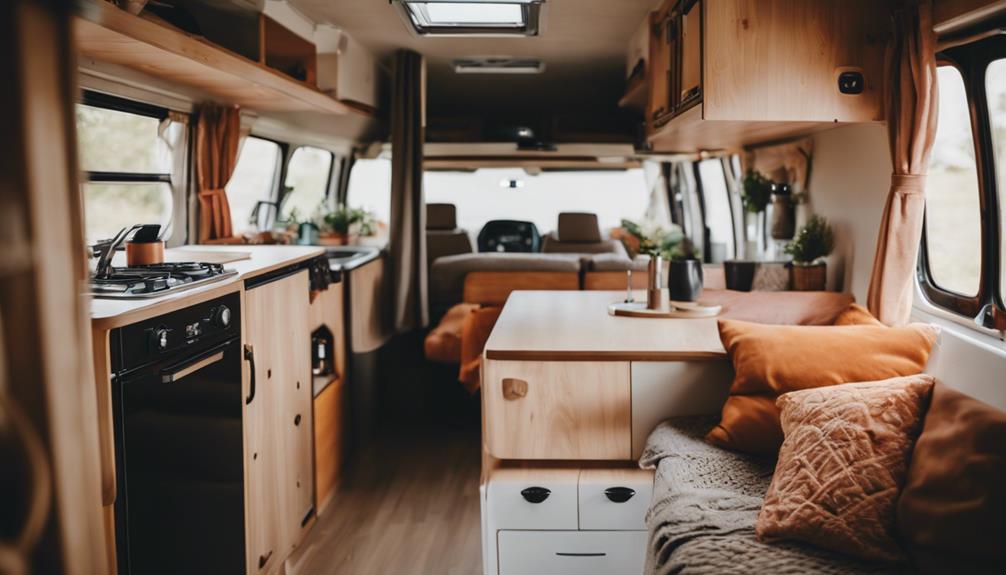
When planning your camper conversion, you'll want to focus on an interior layout that maximizes space and comfort.
Use smart space utilization techniques to create a functional environment, ensuring every inch serves a purpose.
With the right planning tips, you can design a layout that feels open and inviting, even in a compact van.
Interior Layout Planning Tips
Maximizing your camper's interior space starts with prioritizing standing height to secure comfort for taller individuals. A high roof van, offering around 110 inches, provides ample room to move without feeling cramped.
Next, consider the interior layout carefully; this will help you fit essential amenities like kitchens and bathrooms within the van's dimensions.
Incorporate multi-functional furniture designs, such as convertible beds that can be flipped up during the day. This not only maximizes usability but also creates a more spacious feel in your living area. It's vital to visualize your layout using scale planning to guarantee everything fits perfectly.
Don't forget the cab area; integrating it into your living space can enhance openness and comfort, especially during long trips.
Evaluate storage solutions meticulously, utilizing under-bed storage and cabinets to keep your space organized and clutter-free.
Space Utilization Techniques
Effective space utilization techniques can transform a compact van into a comfortable and functional living area, making every square inch count. Start by incorporating multi-functional furniture that serves more than one purpose, like beds that fold up into seating. This maximizes your floor space and allows for a more versatile interior layout.
Next, think about vertical storage solutions. Overhead compartments and wall-mounted shelves can help you use wall space efficiently while keeping your essentials easily accessible. Designating distinct zones within your van—such as a sleeping area, kitchen, and workspace—creates a sense of organization and flow, even in confined spaces.
Consider installing sliding or bi-fold doors for closets and storage, saving space and enhancing accessibility. This design choice allows for easier navigation in your van.
Finally, utilize modular designs for your furniture and fixtures. This enables you to easily reconfigure your interior layout to accommodate changing needs and preferences while traveling.
What are the optimal dimensions for a van to be converted into a camper?
When considering the best van size for camper conversion, the optimal dimensions can vary. Generally, a van with a length of 17 to 19 feet, a width of 6 to 7 feet, and a height of 8 to 9 feet provides enough space for a comfortable camper conversion with essential amenities.
What Is the Optimal Size for a Van to Maximize Space in a Camper Conversion?
When considering the best camper conversion van size, it’s important to prioritize space and functionality. A van that is around 144 to 176 inches in length tends to maximize interior living space while still being manageable for driving and parking. This size allows for comfortable living quarters without sacrificing maneuverability.
Conclusion
Choosing the right van size for your camper conversion is vital, as it directly impacts your comfort and functionality on the road.
When considering different vans, you'll want to gauge your intended use and how much storage you need. For instance, medium-sized vans provide a practical balance between space and maneuverability, while large vans offer ideal space for amenities. If you're taller, opting for a high roof (HR) van can make a significant difference in your comfort level, allowing you to move around without hunching.
Remember, budget considerations play a significant role in your decision. While larger vans provide more room, they often come with higher purchase and maintenance costs. Long wheelbase (LWB) models typically cost around $1,000 more than their short wheelbase (SWB) counterparts. If you're planning for minimalist trips, a small van may suffice, but it might lack the comfort you desire for longer stays.
Ultimately, your choice should reflect your lifestyle and travel aspirations. Evaluating your needs will help you find the perfect van size for your camper conversion, ensuring a comfortable and enjoyable journey ahead.
Frequently Asked Questions
What Size Van Is Best for Camper Conversion?
When choosing a van size for camper conversion, consider your travel style and group size. Larger vans offer comfort for long trips, while smaller ones are ideal for solo travelers or short excursions.
What Vans Are Best for Camper Conversion?
When considering vans for camper conversion, you should look at the Ford Transit, Mercedes-Benz Sprinter, and Dodge Ram Promaster. Each offers unique advantages, so choose one that fits your travel style and needs best.
What Is the Best Vehicle for a Camper Van Conversion?
When choosing the best vehicle for your camper van conversion, consider the Ford Transit for versatility, the Mercedes-Benz Sprinter for luxury, or the Dodge Ram Promaster for budget-friendly options. Your needs will guide your decision.
Is It Worth Converting a Van to a Camper?
Yes, converting a van to a camper's definitely worth it! You'll save money, customize your space, and create a unique travel experience. Plus, it can enhance your connection to vanlife and boost resale value later.
Conclusion
Choosing the right van size for your camper conversion is vital for maximizing space and comfort.
Whether you opt for a compact model or a larger vehicle, it's important to evaluate your specific needs and how you plan to use the space.
By understanding recent innovations and expert insights, you can create a superior interior layout that suits your lifestyle.
Ultimately, the best van is the one that meets your unique requirements while providing a cozy, functional living environment.

